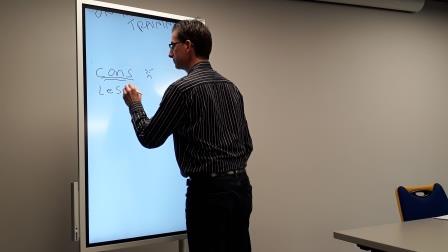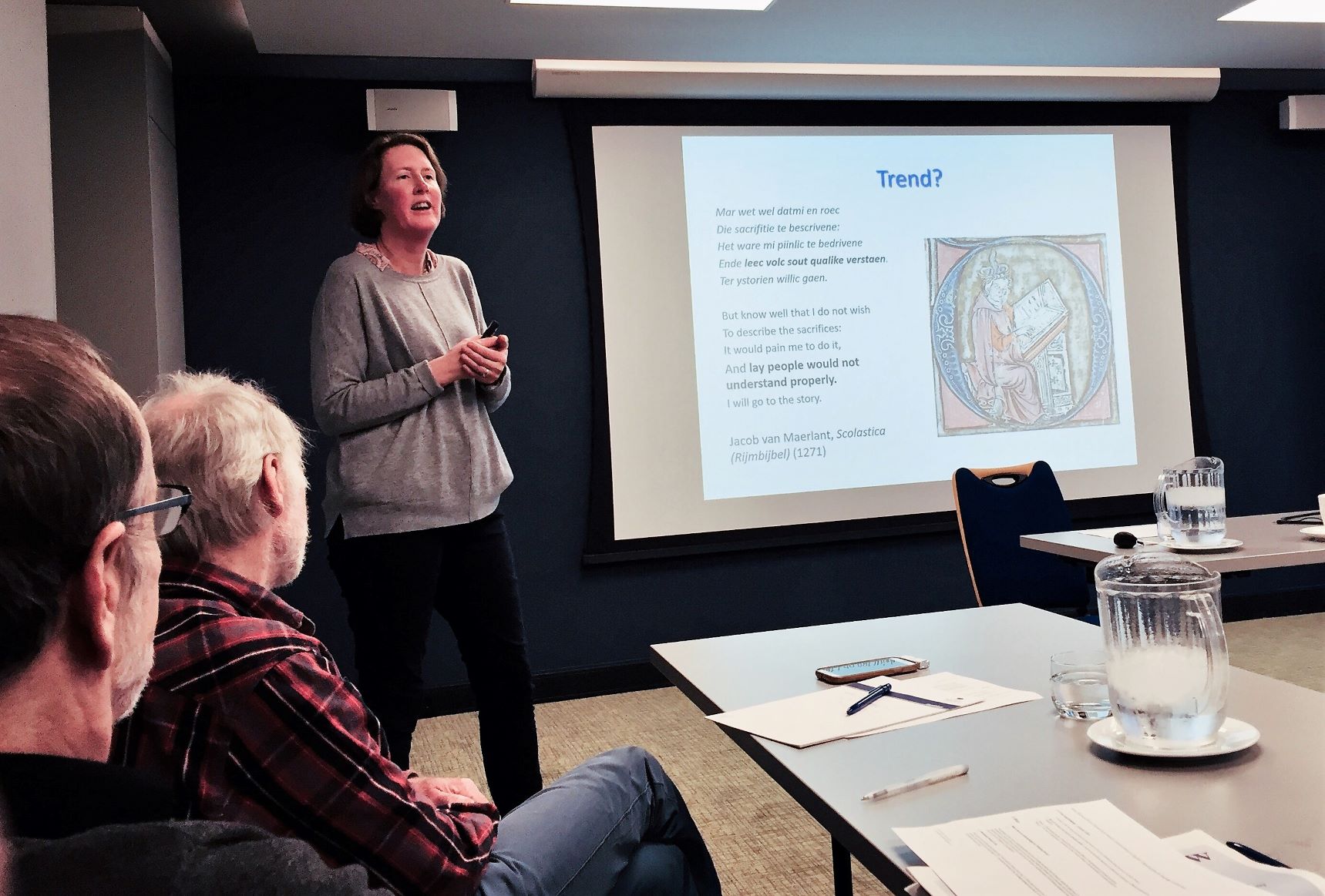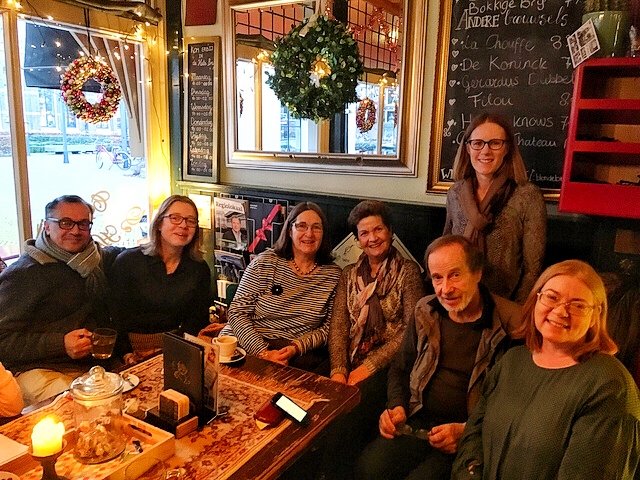
It was a fairly early start in Zwolle for the Eastern SIG meeting, but fortunately there was a Nespresso machine to help us wake up. The topic of the meeting was ‘levels of editing’, an idea that had arisen from a discussion at a previous meeting where Sally and Kumar had mentioned how different their editing styles are. Before the meeting, Kumar and Sally both edited a 300-word text (taken from a medical journal, though not too specialized). The text was also sent around beforehand, so that other members could have a try too.
The intention was that Sally and Kumar would compare their edits at the meeting and discuss them with the other SENSE members present. Why would you choose whether or not to change something? Are the changes justified? Unfortunately, Kumar had to leave almost immediately, but Sally was so well-prepared that this was no problem at all! For each sentence, we compared and discussed the changes that the two of them had made and compared them with our own edits − it was very interesting to hear the different approaches taken. We also discussed the assumptions that we made when editing the text, some of which were not always correct! (As also discussed in this thread on the members-only forum.)
Besides discussing the actual edits made, we also talked about what the editor’s job should/could be, and how this depends on the time available. We then went on to talk about client acquisition and contact with clients.
All in all, a highly informative and certainly well-attended morning!

For the Utrecht SIG, the 8 May meeting marked a return to the Park Plaza after a long remodelling period. The upstairs bar was an excellent new addition, but we all thought the large workshop space was a bit much for only five participants.
The translation of the evening was an analysis document about a company struggling with an unfavourable work culture. The company, historically Dutch but with a large contingent from a specific other country, was recently purchased by an American company. The Dutch consultant who had written the document needed it translated into English as a starting point for conversation with the American management.
Despite a few odd turns of phrase ('de juiste maat en modus vinden', 'deze notitie vormt de onderlegger voor het gesprek'), the text had very few grammatical issues. But boy was it vague. The consultant firmly refused to put their finger on many of the actual pain points and left a lot to be read as subtext. This is fine for an 'onderlegger voor een gesprek' – you can clarify the finer points during the actual conversation – but it makes life difficult for a translator. Instead of translating what it says, we ended up trying to find the right translation for what it didn’t say. That required extensive mindreading.
If something 'doet iets met het al dan niet vertrouwen hebben in mensen', does that mean lack of confidence or lack of trust? Especially if some people then 'koppelen dit aan de [other country’s] versus Nederlandse cultuur'? You get the sense someone is being racist, but who? And are they implying that they’re sick of some people showing up late or being stiff and judgemental, or that they’re afraid to leave their wallets out in the open?
We spent some time going round and round with this. With a text like this, the nuance is very important. Still, the client was very happy with the original translation, which was not all that nuanced because it had a really tight deadline. I guess the fact it was an onderlegger works both ways.
As usual, the main conclusion of the evening was: ‘If we could do all translations in a group, like this, all our clients would think we’re brilliant.’ Also want to feel brilliant? The next Utrecht SIG meeting will be held on 10 July at the Park Plaza Hotel in Utrecht. With a fancy upstairs bar!

On Friday 12 April, 14 SENSE members gathered at Park Plaza Utrecht to receive an answer to the question: ‘Do online editing services have a place in your client portfolio?’
After a short introduction round, Curtis Barrett took the floor to share his past experience working for one of the largest international online science editing agencies. A scientist originally from New York, Curtis emigrated to the Netherlands nearly 12 years ago to work as a senior researcher at Leiden University Medical Center (LUMC). As a native English-speaking scientist, he realized that his PhD and postdoc years had given him a wealth of scientific expertise as well as sound academic writing skills, and he discovered an affinity for science editing. After leaving LUMC and accepting a freelance contract position at the editing agency, he learned the ins and outs of editing and discovered his full value as a science editor. During his presentation, Curtis explained how he progressed from being a junior editor to a senior editor at the agency, identifying the potential pros and cons of working with an online agency, and enlightened us with some excellent take-home messages.
Curtis identified the following advantages and disadvantages of working for online editing agencies:
Pros:
- On-the-job training: working for an agency proved a valuable learning experience. They had guidelines and a glossary available, which included explanations about the split infinitive, the serial comma, why the first person is preferable to the third person, ‘which’ vs. ‘that’, etc.;
- Work acquisition: the agency was saturating the internet, thereby guaranteeing a high volume of editing jobs;
- Variety/diversity: editing jobs were offered for a wide range of topics varying from biology to genetics;
- Anonymity (also a con);
- Assurance of payment.
Cons:
- Relatively low pay (but editors could often negotiate);
- Tight deadlines;
- Anonymity: at this agency, editors only have contact with the managing editor, not the author.
- Editors often receive little or no feedback from either the client or the agency. There is usually no opportunity to discuss anything with the author, for instance if important pieces of text seem to be missing.
- Low-cost, short-turnaround editing;
- Quality can suffer in order to maintain quantity;
- The agency’s house style may be pushed on you.
Take-home messages:
To answer the key question: yes, online editing services can have a place in your client portfolio, provided you do some research in advance. If you are considering an offer to work with an agency but are in doubt, enquire on the members-only SENSE forum. And don’t shy away if the agency wants you to take a test, even if it's not a paid test.
Braving the icy north-easterly winds, a gritty bunch of seven SENSE members gathered last Friday afternoon at Café de Beurs in Zwolle to raise a glass (and enjoy a few bar snacks) to put the world – of editing, translation and whatever else we do – to rights. Discussion topics ranged from ‘how to get more clients' (a SENSE-wide topic) to coping with MemoQ, via a large-scale English-to-Dutch medical terminology database project over the coming two years, finding good facilities for children with special needs, English (and Dutch) book clubs and where to find them, what happens when translation clients promise work which they then hand to others, not to mention getting to grips with the A–Z of the Eastern provinces!
Informal meetings are a great way of getting to know other members and hearing all about what their work involves, plus the cross-fertilization that this often brings; not to mention a great way of introducing new people to SENSE!
The Utrecht Translation group met on 13 March to discuss a text from a member who translates quite a lot of urban and spatial planning documents. Accordingly, we had a piece full of choice policy jargon about the new National Environment and Planning Strategy.
From virtually the very beginning we were making our way through a jungle of a nationale omgevingsvisie. Thankfully, the member who had supplied the text was there and helped us hack our way through.
Texts like these may seem vague, but they have to be somewhat concrete. The translator can’t be too free, although a little creativity does help. The passive voice can be aggravating in these documents. A few of us were foxed by the linking words that start sentences (daarbij, hierdoor, etc). Although it’s scary to cut a word that’s been put in a piece of policy by a committee, we were assured by a few of the Dutch native speakers present that sometimes these words really don’t mean anything on their own and they can go. It was quite interesting to hear all the different solutions and learn why some work and others don’t. We got through two of the four paragraphs to be translated but, to be fair, we might have got a few sentences further if the Bistrot hadn’t closed at 21:30.
It was a large and convivial group (14, but 17 had signed up!). Some of the several new faces had experience in this area too.
In other news, I have stepped down as convener (as of this year’s AGM). It’s a fine position that didn’t demand that much of my time, but after so many years it was time to let it go. Maartje Gorte has offered to replace me, and I’m sure she’ll be more than capable.
The Eastern SIG is officially out of hibernation. And the second formal meeting of the season was appropriately held just before the first day of spring. It was a good turnout with seven participants, and the morning’s topic was Brexit. Or is it Breggsit? Even its pronunciation triggered a discussion. Although Brexit is undoubtedly a divisive topic, our meeting was a model of harmony. We covered a range of Brexit-related topics, kicking off with a newsletter from the Dutch Immigration and Naturalisation Service (IND) and later moving on to letters to the editor of the Dutch quality daily paper Trouw.
It was difficult to tell whether the newsletter had been written directly in English or translated from the Dutch. We had fun trying to figure out which. One thing no-one had any doubts about was that the author was a non-native speaker, considering perplexing headings such as ‘Visitors open Brexit meetings pleased with IND presence’ and the references to ‘British’ when referring to Britons. It also got us talking about the (non)sense of embedded brackets and why it’s ‘Brexit’ in the UK and ‘de brexit’ in the Netherlands.
But we were not only there to linger over language. We had more important issues to tackle. Brexit itself. So we looked at the merits of solutions to Brexit submitted by readers of Trouw, one by our very own convener. Her suggestion was to set up a citizens’ assembly, similar to the one held in Ireland. Just as we had finished talking about this sensible course of action, several of us happened to receive an email from the IND. Attached was their second newsletter and, believe it or not, this one contained none of the errors we had just been discussing. We suspect that the IND is keeping tabs on us. In which case, we might be able to solve Brexit after all!
One new member of SENSE commented: "I felt very welcome during my first presence at a SIG meeting. As a starting translator into French and English (a native Dutch speaker), it was very useful for me to hear about the experiences of others – translators and otherwise – working in the field of languages. I was impressed with the thorough comments made by the native speakers in the group on an English text from a Dutch organization, which we analysed during our meeting and which, at first sight, seemed okay to me! I learned a lot, and look forward to more networking within SENSE."

A small but animated group of eight met up at Bistrot Centraal on 9 January for a post-holiday catch-up and to discuss the ups and downs of our professional lives.
(In)visible translations
The topics discussed were many and varied. One issue brought up was potential clients not being able to find your work on the internet if your translation is only used for something like an app, especially one for which people have to pay. (The example was a tourism app from one of the Dutch VVVs.) While you can refer prospects wanting to see samples of your work to a published book/journal, or send them to a web page via a search engine, search engines can’t ‘see’ apps. When the sole destination of your translation is an app, the chance of a possible client finding your pet project is virtually nil. There is no solution yet, but if you’re proud of what you’ve written/translated for that app, beware, and see if there’s a way to make it available (eg, on your own website).
Getting yourself sworn
Someone else was curious about what being a sworn (beëdigd) translator entails, as well as what advantages it might have. Fortunately, one member who was present is a sworn English-Dutch translator and was happy to share her experience. In brief:
- there is probably more work from Dutch to English; much is short documents like birth certificates and diplomas, but we don’t know enough to say how much work might be longer documents
- there is no option to register a specialization (eg, medical), so be responsible about what you can do
- translating the same kind of documents may feel tedious at first, but soon you’ll build up a ‘library’ and it will go much faster
- since the translated document is supposed to also resemble the original as much as possible, you’re often fiddling with PDF conversion, which is not everyone’s cup of tea
- if you’re working for a court, they have often contracted with an agency and fees are therefore not negotiable
- it costs €125 to become sworn, plus €40 for the VOG (Verklaring Omtrent het Gedrag or Certificate of Conduct)
- you need to keep up your PE points (80 per 5 years) but there’s the option of following a minor at eg, ITV Hogeschool instead of attending several workshops/courses
- liability insurance is also recommended
- the status seems to impress customers even if they don’t need a sworn translation.
For those wanting to know about the current terms for registration, they can be found on the WBTV website.
Quoting for jobs
There was also a question about rates and how to quote for a job. This seems to be a hot topic right now, according to people who use other forums, with translators encouraging one another to charge more for their services. Perhaps the economic upturn is making even translators optimistic? One member pointed to the Editorial Freelancers' Association's list of the typical hourly rates for different types of editing and other work including translation. If you’re interested in knowing more, Sally Hill has written three articles on ‘Quoting for jobs’ for eSense. (Part 1 is on p.12 of eSense 41, part 2 is on p.13 of eSense 42 and part 3 is on p.18 of eSense 43.
Upcoming SENSE events
As an aside, we heard during our meeting that work has already begun on organizing the 2020 SENSE conference. Although nothing has been set in stone, there is already some planning and extending of feelers. Spirits were high; we even got as far as proposing Hillary Clinton and Michelle Obama as keynote speakers! More information about both the conference and the upcoming (September) Professional Development Day will be forthcoming at SENSE’s Annual General Meeting (AGM) on 23 March.
Our next meeting is scheduled for 13 March, venue to be announced.

UniSIG launched its 2019 programme with a presentation by SENSE member and academic editor and lecturer Maria Sherwood-Smith on ‘Outreach and research communication in English: Opportunities for language professionals’. This was an opportunity for members who had missed her SENSE 2018 conference session in June to attend a reprise. The chord she and her subject-matter struck with the 19 participants (including three newcomers to UniSIG) made for a lively, interactive session from which all left seriously thought-provoked. SENSE members John Linnegar and Theresa Truax-Gischler report back.
Communicating one’s research is a challenge at the best of times, but doing so in a second language to a variety of audiences, some of them multidisciplinary, some lay, is often beyond the capabilities of many a researcher. With the increasing emphasis in research funding on communication with non-specialists, policy-makers and the public, this new genre of speaking and writing has become a core academic competency, a reality many universities have been slow to embrace. Enter the language professionals – either as copywriters, editors or translators, or as teachers of writing and communication – to help researchers ‘sell’ their work to funding agencies, industry, government and the general public.
In a master’s course at Leiden University, Maria and two subject specialists work with the students at honing the content and structure of a brief research talk. Maria shared the ‘Daisy model’ applied in this course as a way of effectively organizing and presenting complex research. The model alerts authors to the genres and registers that best suit their target audience. In doing so, it points writers and speakers towards identifying their core message, expressing it in everyday, non-technical language and indicating its relevance to broader societal issues.
The vexed matter of formulating and wording grant applications took up much of the session, with a range of stimulating views being expressed around the room; but the drafting of brochures, blogs, websites, tweets, pubcasts and similar communications has also become necessary nowadays. For these media, experts other than the researcher are often needed. But how will they be accommodated and funded by institutions of higher education? Perhaps in combination with teaching academic writing and presentation skills or via the creation of university writing centres?
These and other issues were echoed in the animated Q&A exchanges with which the event ended – continuing into the drinks session that ensued. The takeaway message? There is a great need for language practitioners with the expertise to convert (or to teach how to convert) texts so that they communicate effectively to diverse audiences; but will the universities be able to deliver?
SENSE has a number of special interest groups (SIGs) which meet regularly throughout the country. They are open to all members, and guests are welcome to attend one or two meetings before deciding whether they would like to join SENSE. See the events calendar for more details.

On Friday 14 December, six Eastern SIG members, one ex-member and a potential member all braved the pre-Christmas crowds in Zwolle to enjoy what turned out to be a very jolly ‘happy hour’ gathering.
Despite best efforts by Sally Hill and myself, the table we had bagged and hoped to hold for the group gradually filled with café regulars. This turned out to be a blessing in disguise, however, as we were forced to find extra chairs to ‘expand the circle’ (as in a full-blown traditional Dutch birthday party) so we had no choice but to get even more up close and personal.
The venue – café De Hete Brij – lived up to its fifth place in the Dutch café top 100. Credit to Elles Hetebrij, the owner and creative brain behind this small but gezellig café. I think I can speak for all the attendees when I say it was refreshing to meet and talk with fellow wordsmiths in an informal atmosphere without a pre-set agenda. It’s amazing what a convivial setting and the Christmas spirit can do.
Once the supply of bitterballen had dried up, five of us plus one member’s husband, who joined us later, went in search of a place to have a meal, but could we find a table in the centre of Zwolle? No way. Until someone suggested heading to a shoarma restaurant close by that they'd been wanting to try for a while. And as if by magic, there was just enough space for the six of us. The broad selection of lahmacuns on offer proved to be too tempting for the majority. Washed down with a cool Efes beer, it was just what the doctor ordered.
It must have been around 20:00 when we all went our separate ways – convinced that an Eastern SIG tradition had been born. See you all in February for the next regular meet-up!
SENSE has a number of special interest groups (SIGs) which meet regularly throughout the country. They are open to all members, and guests are welcome to attend one or two meetings before deciding whether they would like to join SENSE. See the events calendar for more details.

The most recent SENSE Ed SIG took place on Saturday 8 December at Park Plaza Hotel in Utrecht, where Giulia Colacicco, a PhD candidate in mathematics, gave a presentation on ‘Contrasting learning methods.’
Giulia gave a demonstration, drawn from her master’s thesis, of a new way to teach mathematical concepts to high-school students. We looked at several videos in which two dots moved back and forth while we were asked to express our perceptions of what we were seeing. More information was added to each successive video, first gridlines, then numbers running along each line.
If you think back to your high-school maths classes, do you remember functions? It turned out the two dots were the values x and y on which a function is based. Giulia reported that this new approach has quite a few advantages. The students on whom she tested her method reacted positively to both the visual presentation of the material and the opportunity to discuss how things worked with their peers. This meant that they learnt together at their own tempo, instead of being individually pressed to give answers. Giulia then presented the traditional equations with which this concept is normally taught, and the contrast was quite striking.
In the second half of the meeting we investigated two ways of learning a language, namely Chinese. This time we did things the other way around. I started by presenting an ‘old’ method – Hugo’s Chinese in Three Months – which I bought back in the 90s. This starts with long explanations of how the tonal system of Chinese works, and builds up (slowly) to words and then a few sentences. Everything was explained in quite laborious detail.
We then switched to the online method developed by Rosetta Stone. Here, no verbal explanations of any grammar or pronunciation points are given, and there is not a word of English in sight. Instead, the student looks at pictures and learns by example. Once a word is taught, it must be successfully picked out from a series of photos on a later page. Grammar is also taught by inference without stating rules.
The attendees certainly seemed to prefer the new method. However, it is worth pointing out that there are no resources such as dictionaries (you have to learn the word and then remember it), one never hears what an extended conversation is like (Hugo’s audio material does offer this) and the method is pretty expensive. What’s more, once your online subscription expires, you lose access to the materials, so you can’t review anything.
Our group had a very enjoyable afternoon, enhanced by the excellent technical facilities offered by Park Plaza’s newly renovated meeting rooms. It is unfortunate that the turnout was so low. Please keep an eye out for the next SENSE Ed SIG meeting, which will be held sometime in May.
SENSE has a number of special interest groups (SIGs) which meet regularly throughout the country. They are open to all members, and guests are welcome to attend one or two meetings before deciding whether they would like to join SENSE. See the events calendar for more details.


